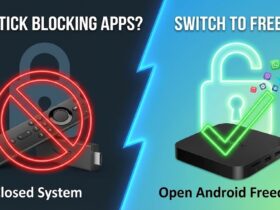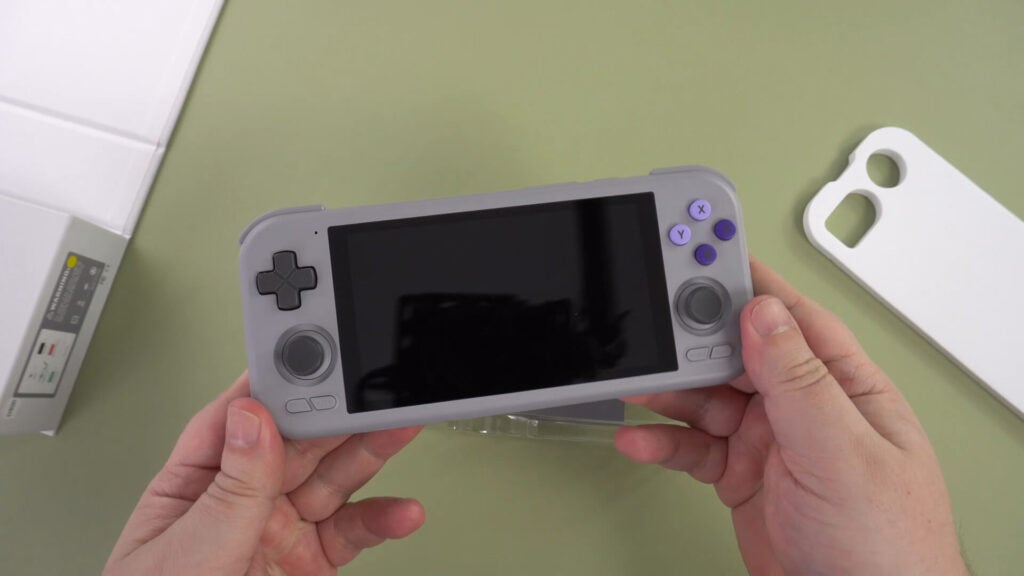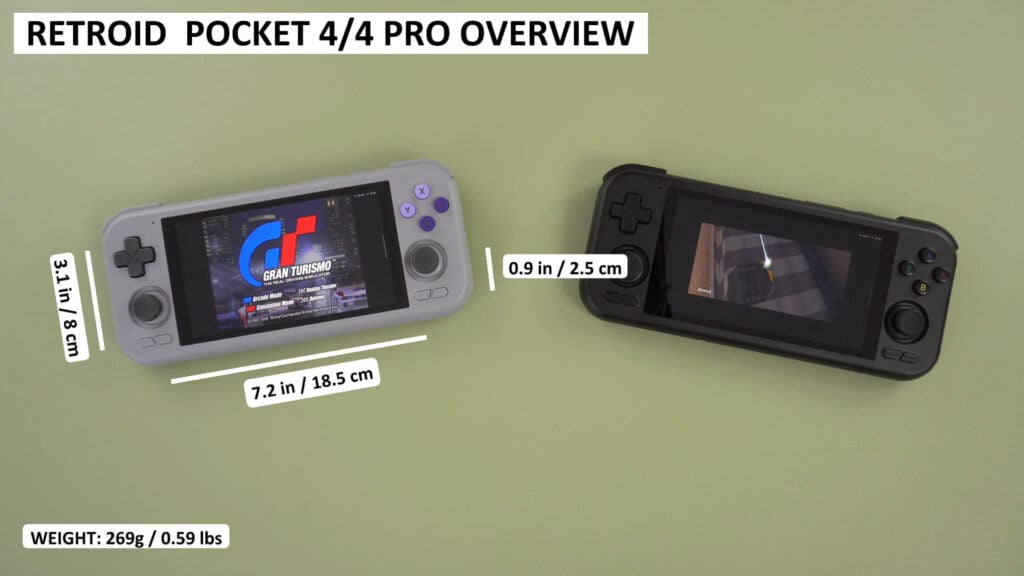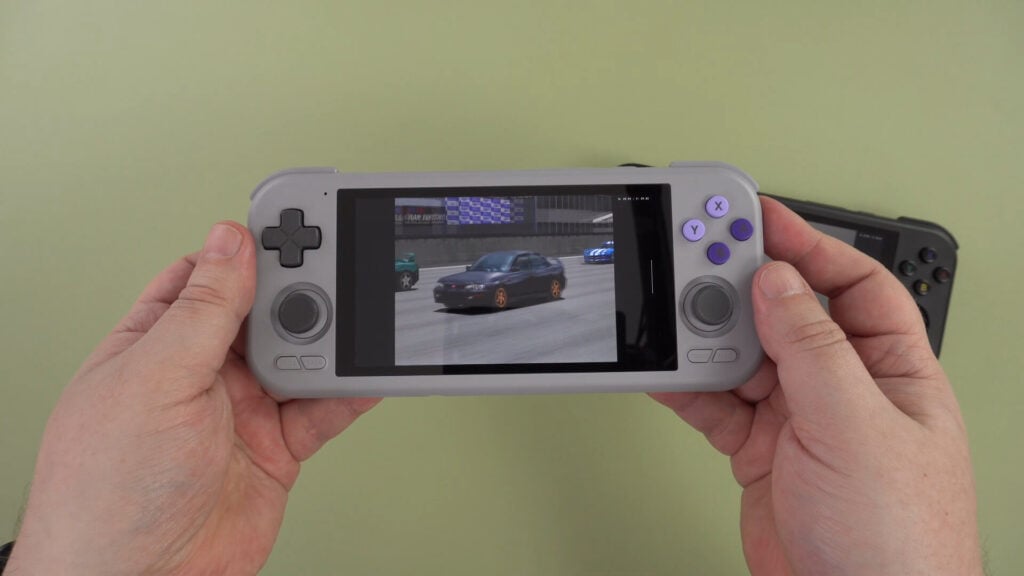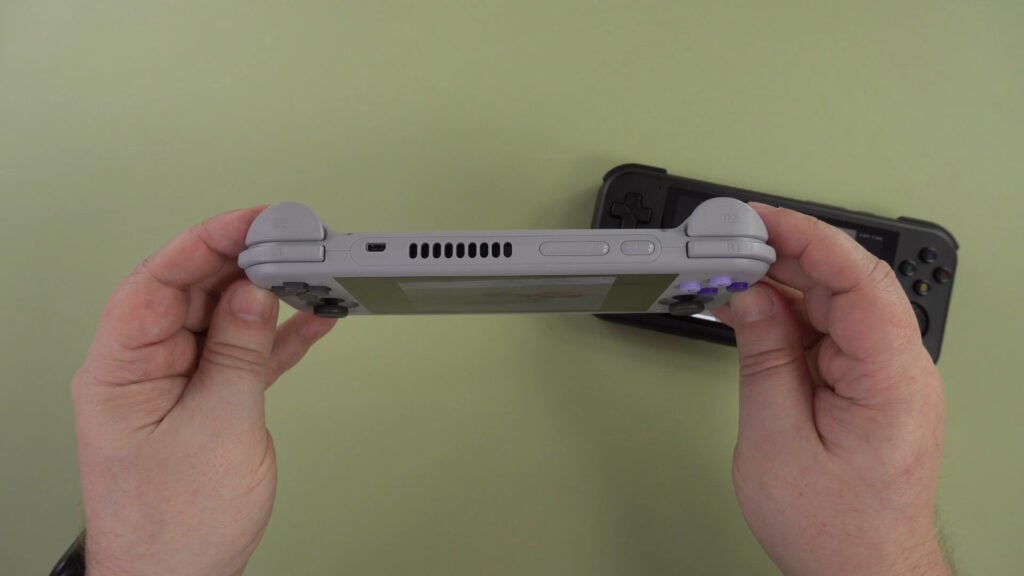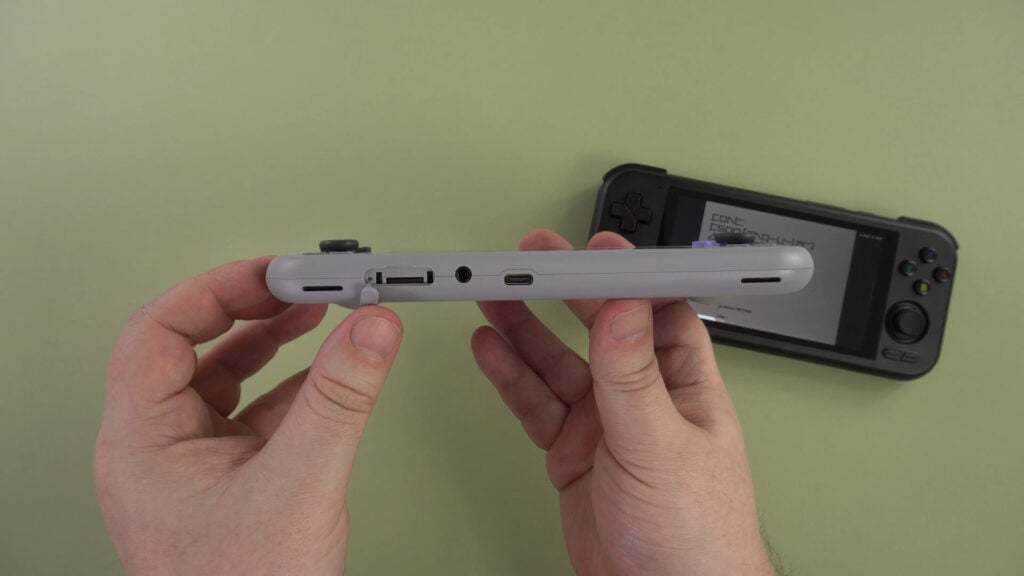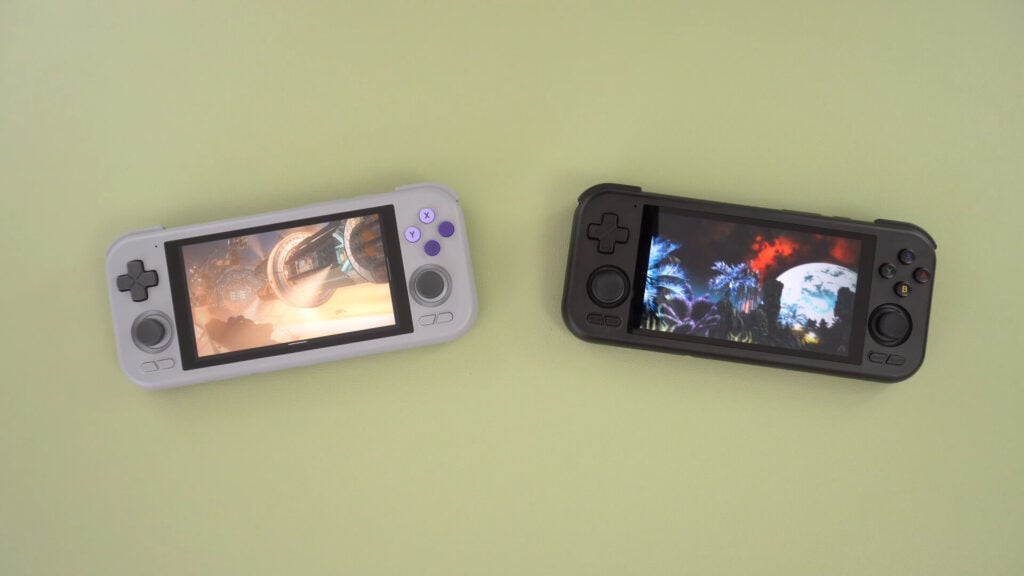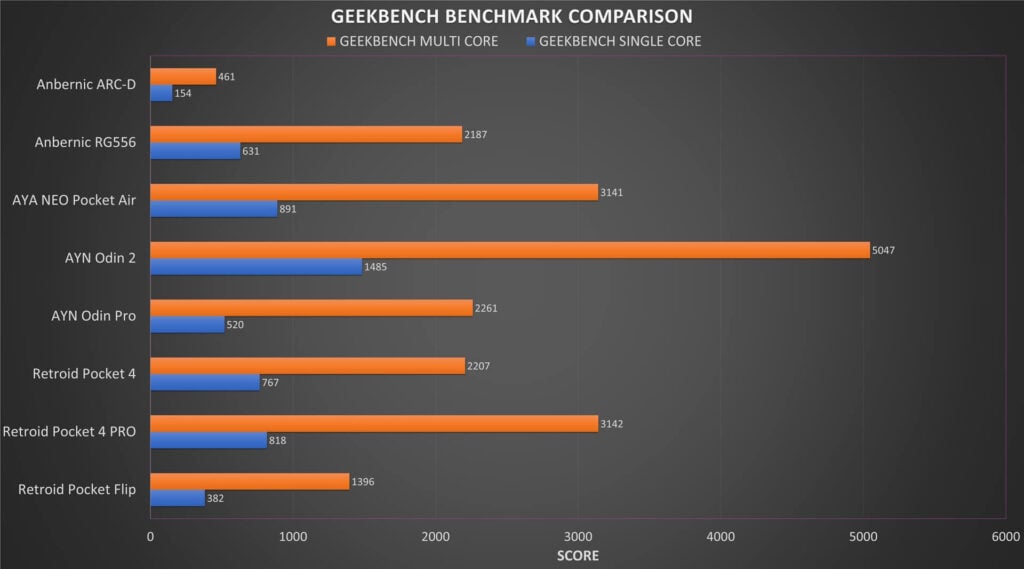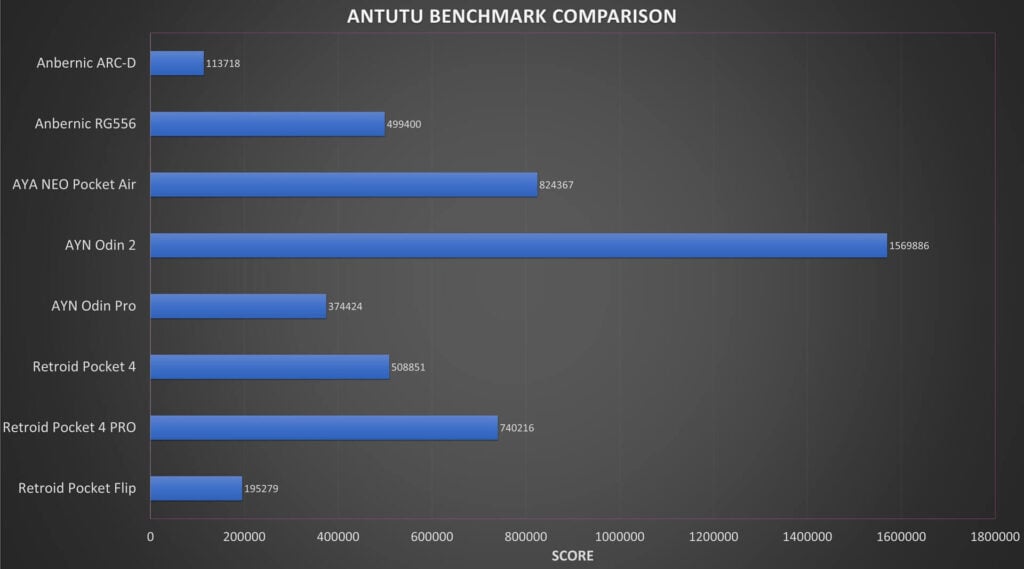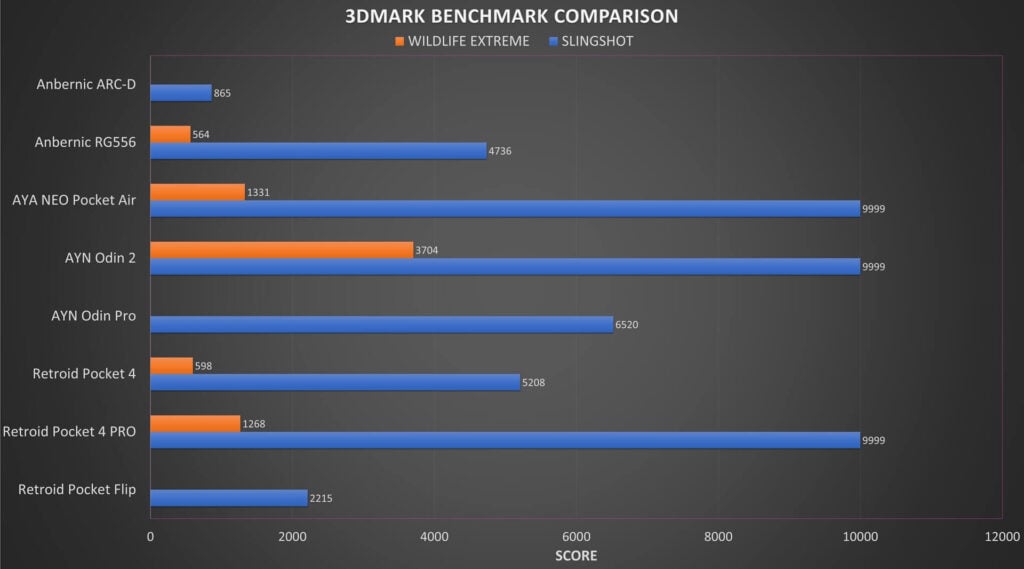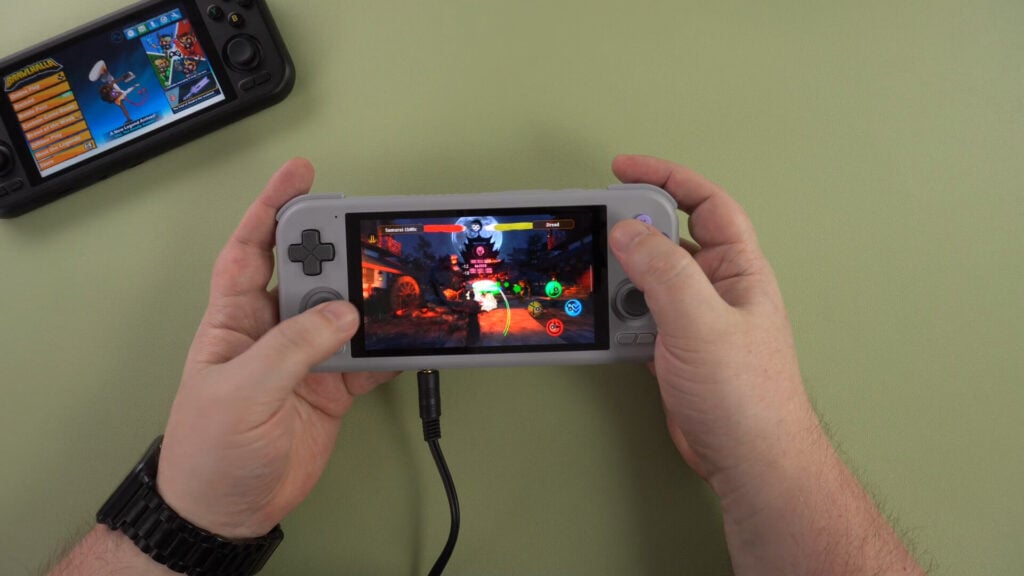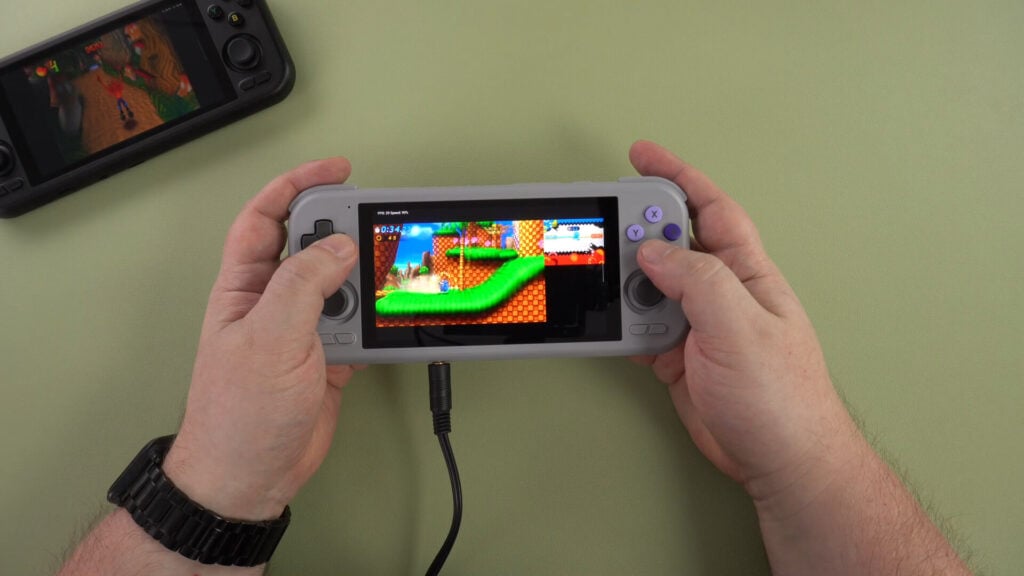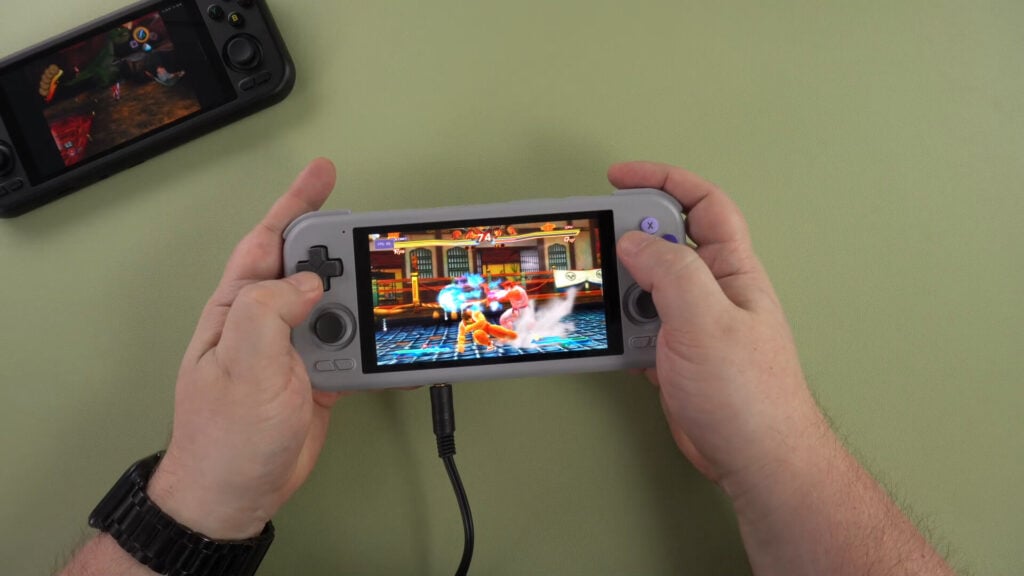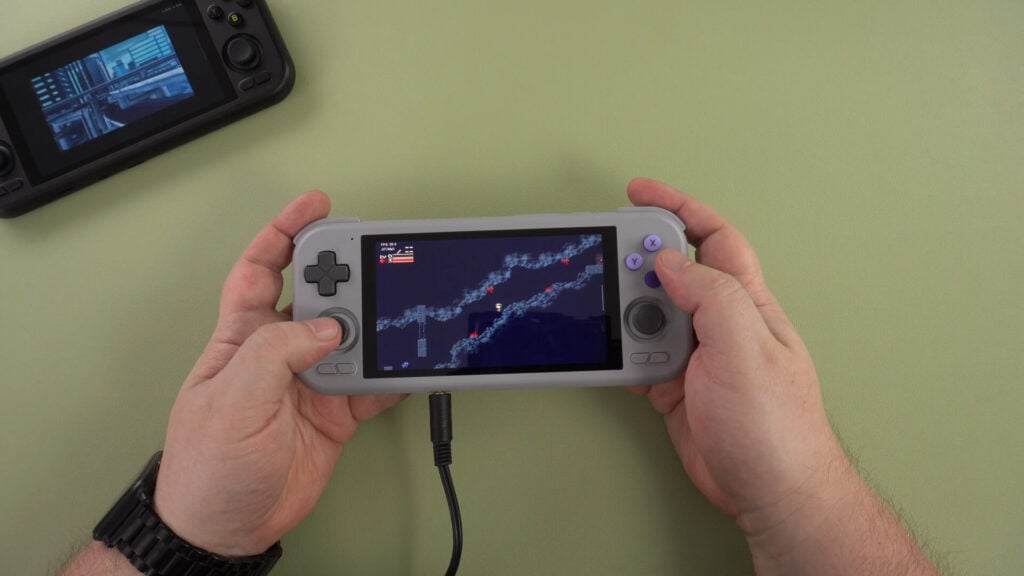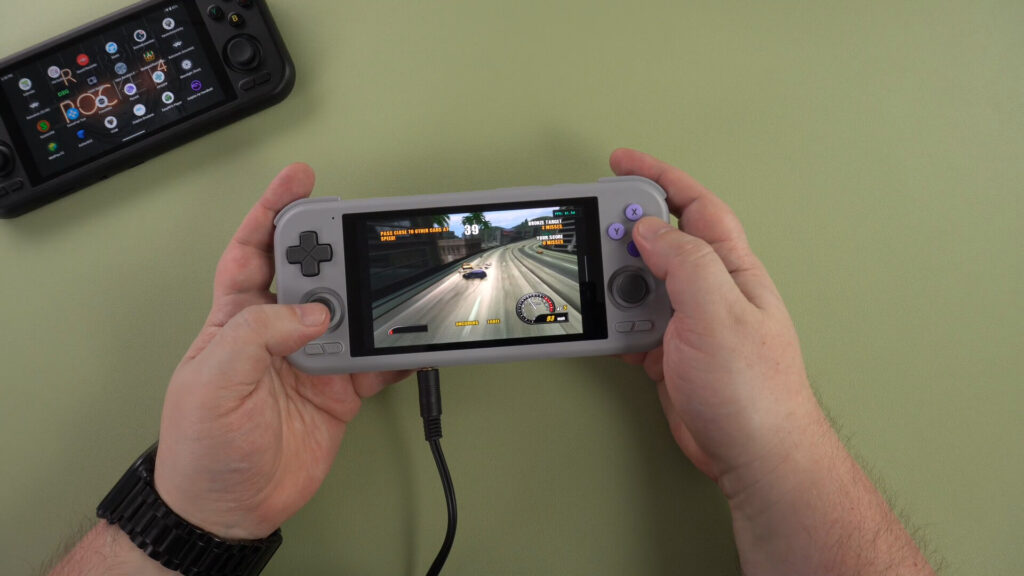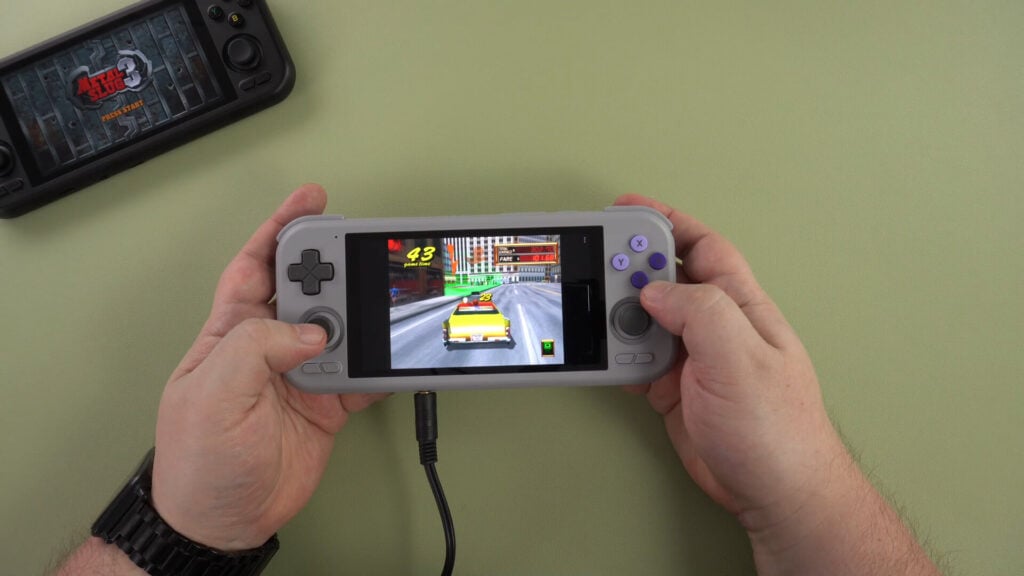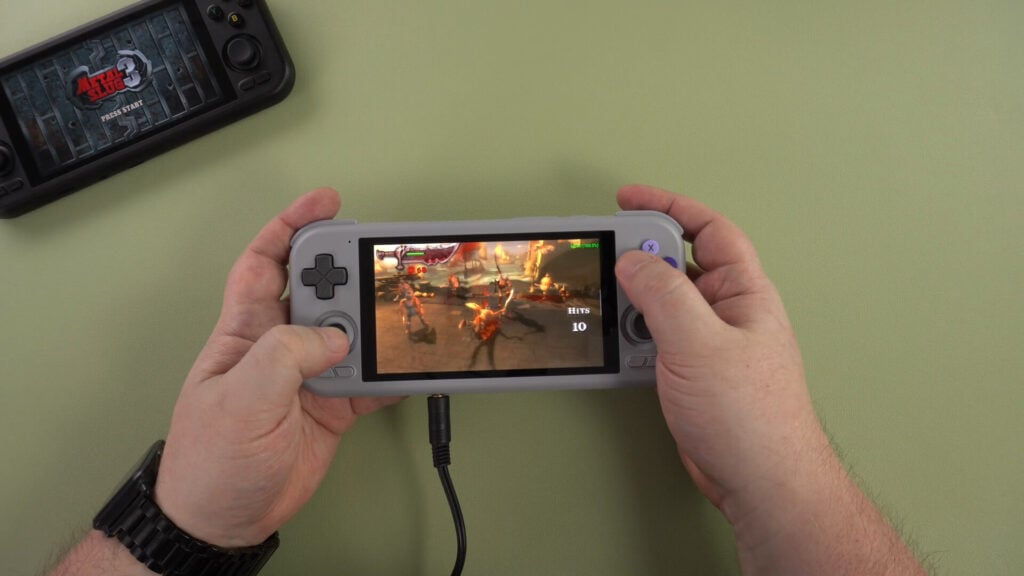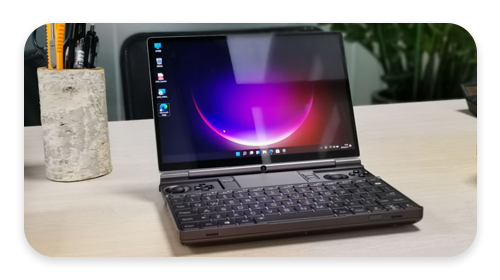Retroid Pocket 4 vs Retroid Pocket 4 PRO
-
Design
(4.5)
-
Build Quality
(4.5)
-
Display
(4.5)
-
Performance
(4.5)
-
Features
(4.5)
-
Software
(4.5)
Summary
Overall
4.5User Review
( votes)Pros
- 25% cheaper than the PRO model
- Sufficient for Android Gaming
- Shares the same compact and sturdy build as the PRO version
- Still great for emulation
Cons
- Lower performance compared to 4 PRO model
- Android 11 instead of 13 on 4 PRO
The lower priced alternative to the Retroid Pocket 4 PRO is now finally available! Let’s find out how the Retroid Pocket 4 Android gaming handheld compares as we check out the hardware and software, run some system benchmarks and try some games and emulators. Which is the best performance versus price? Find out in our Retroid Pocket 4 vs Retroid Pocket 4 PRO review.
Retroid Pocket 4 vs Retroid Pocket 4 PRO
Retroid Pocket 4 unboxing
We start our Retroid Pocket 4 vs Retroid Pocket 4 PRO review with a very brief unboxing for the Retroid Pocket 4.
Inside the box there is the device itself, we will check it out in more detail in a moment. Underneath is a user guide which doesn’t really help much, there is a proper guide in the Retroid app. And there is a USB Type-C charge cable. Told you it was brief!
Retroid Pocket 4 overview
Next in our Retroid Pocket 4 vs Retroid Pocket 4 PRO review we take a closer look at the Android gaming console. Both the Retroid Pocket 4 and 4 PRO measure 7.2 x 3.1 x 0.9 inches (18.5 x 8 x 2.5 cm ) and weigh 269g.
They are available in six colours 16 bit, 16bit US shown here, Black, Crystal, Ice Blue and Watermelon.
The display is an IPS touchscreen measuring 4.7 inches with a 750×1334 resolution. You have all the usual controls including D-Pad, Analogues and gaming buttons. On the bottom left area are Home and Back buttons for Android usage.
The top has shoulder and trigger buttons on either side, followed by a micro HDMI port for output to a monitor or TV. There is the volume rocker and the power button.
On the bottom is a covered micro SD card slot, 3.5 mm headphone port and USB Type-C port for charging and data.
Retroid Pocket 4 vs 4 PRO technical specifications
Under the hood there are some different technical specifications between the two Android gadgets.
| RETROID POCKET 4 | RETROID POCKET 4 PRO | |
| CPU (CORES) | Dimensity 900 2x A78 @2.4GHz 6x A55 @2.0GHz | Dimensity 1100 4x A78 @2.6GHz 4x A55 @2.0 GHz |
| GPU | Mali G68 MC4 @900MHz | Mali G77 MC9 @836MHz |
| RAM | 4GB LPDDR4x | 8GB LPDDR4x |
| OS | Android 11 | Android 13 |
Both models share the remainder of the specs.
| DISPLAY | 4.7″ touchscreen, 750×1334 @60fps, 500nits |
| STORAGE | 128GB UFS 3.1 + Micro SD Card Slot |
| COMMUNICATIONS | Wi-Fi 6 Bluetooth 5.2 |
| BATTERY | 5000mAh rechargeable battery |
In our original Retroid Pocket 4 PRO review tests we got around 2 hours 50 mins while running the Antutu benchmark on a loop using the performance profile. For the Retroid Pocket 4 we got a higher run time of 3 hours 30 minutes, likely due to the two less high performance cores it has.
Both Retroid devices cooling are the same so it was no surprise we got the same results In our fan noise and temperature tests. We got a highest fan noise of 55 db while using the Smart profile. And for the highest temperature they were around 42 °C.
Retroid Pocket 4 vs 4 PRO benchmark comparison
We will run some system benchmarks to see how both the Retroid Pocket 4 and 4 PRO perform against each other as well as some other Android handhelds.
Geekbench
We start the benchmarks with Geekbench which tests the processors single and multi-core performance.
For the Retroid Pocket 4 we get a single core score of 767 and multi-core speed of 2,207, and for the 4 PRO we get an increase of 818 and 3142.
Compared with the other devices we can see the Pocket 4 is in the ballpark of the AYN Odin PRO and Anbernic RG556, whereas the 4 PRO is comparable to the AYA NEO Pocket Air.
Antutu
Antutu is a general overall series of tests from general usage, media playback and UI performance.
We got a score of 508 thousand on the Retroid Pocket 4, and 740 thousand on the Retroid Pocket 4 PRO.
Compared with other devices that puts the Pocket 4 again in line with the Anbernic RG556, and the 4 PRO this time slightly behind the AYANEO Pocket Air.
3DMARK
Our final benchmark is 3DMARK which tests the performance of the CPU and GPU working together.
The Retroid Pocket 4 scores 5,208 on Slingshot benchmark and 598 on the Wildlife Extreme benchmarks. The Pocket 4 PRO maxed out on the Slingshot benchmark and scored a very respectable 1,268 on Wildlife extreme.
Compared with other devices the Pocket 4 is again in line with the RG556 and the 4 PRO with the AYANEO Pocket Air.
Benchmark Summary
We all know that the Retroid Pocket 4 PRO was going to outperform the Retroid Pocket 4, but the increase in performance was quite surprising. On Geekbench we see a 6% and 42% increase on single and multi-core performance respectively. On Antutu we see an increase of around 45% in favour of the Retroid Pocket 4 PRO.
And on 3DMARK we see a 112% increase on Wildlife Extreme for the 4 PRO. We can’t accurately tell the increase on Slingshot as the score maxed out and doesn’t report what the highest score is.
Gaming Performance
We know from our Retroid Pocket 4 PRO review that gaming and emulation are both great. Check out that review if you want to see game and emulation footage for the 4 PRO.
We tried a few different games on the Retroid Pocket 4 and saw no real difference in performance compared to the 4 PRO. This could include some graphics settings being set lower, but generally I find Android games are designed to work on a certain standard to cover all bases. So for Android gaming, both are perfectly fine for this.
Emulation Performance
For emulation you are going to see decent performance on both Android Gaming Handhelds. Some things to keep in mind are that the AetherSX2, Citra and Yuzu emulators are no longer in development. These are the three high end emulators and they were quite demanding. We saw in our Retroid Pocket 4 PRO review some very good performance on these three emulators.
I tried the same games on the Retroid Pocket 4 to compare. On AetherSX2 I saw that Gran Turismo 3 did drop to around 40 frames per second in busy scenes, compared to the 4 PRO remaining mostly at 60.
On Citra there was shader caching lag on both devices. The Pocket 4 PRO had smaller freezes and lower drops in frames compared to the Pocket 4, which had longer and higher drops in frame rate. However, once shaders have been cached I did not see a massive difference in overall performance between the two models.
The Vita 3K emulator performs very well on the Pocket 4, there’s some minor shader cache lags but overall it runs very well. The performance on the Pocket 4 PRO means you can run games at 2x resolution which is a nice feature to have.
And last but not least is Yuzu. On the Retroid Pocket 4 we get some OK performance on Cruis’n Blast. We did get a lot of freezes and frame drops playing the game the first time around, but it was fairly smooth when racing the same map again. On the Pocket 4 PRO we saw less time freezing and an overall smoother experience in comparison when first playing.
Final Thoughts
Let’s sum up our thoughts with the Retroid Pocket 4 vs Retroid Pocket 4 PRO.
In our system benchmarks we saw anything from a 6% up to 112% increase in performance across the tests. I would say the Pocket 4 PRO is on average twice as fast but it can depend on the software being used in terms of CPU and GPU demand.
The price is for many of us an important factor when buying an Android gaming device,. There is roughly a 25% difference in price, around 70 dollars or pounds. The Retroid Pocket 4 is a decent price and comparable with other similar specification handhelds. However, the Pocket 4 PRO represents excellent value for money. To put it in comparison, it mostly matches performance with the AYANEO Pocket Air and that costs twice as much as the 4 PRO.
So if you want the best performance for your money I would recommend the Retroid Pocket 4 PRO. We see double the performance for around 25% price difference, it’s really excellent value for money when compared to other devices.
That’s not to say the Retroid Pocket 4 is bad. It is lower cost and as such its lower performance, but is that a bad thing? See it this way, for all the Android games we played we had no issues with performance. And for emulation it was only until we tried the higher end emulators that we saw differences in performance.
Consider that three of the four high end emulators are no longer being developed for and it may be some time until there are replacements for them. With a little bit of patience these emulators kind of run OK on the Retroid Pocket 4. Sure you may need to play through levels for example in order to generate the shader caches, but that’s not for every game.
All of the earlier emulators such as DuckStation run amazingly well on the Pocket 4. So if the 5th and 6th generation consoles, say up to the Dreamcast era, are what you are interested in, save some cash and go for the Pocket 4.
Whatever model you choose, you can be sure you are getting a great handheld that represents great value for money. You can learn more and buy your Retroid Pocket 4 or 4 PRO here. Use the discount code RP45OFF on the Checkout. The code is valid for one month of this review being posted, and can not be used during store sales or other promotions.
We hope you have enjoyed reading (or watching) our Retroid Pocket 4 vs Retroid Pocket 4 PRO article. If you have any questions please feel free to ask in the comments.






